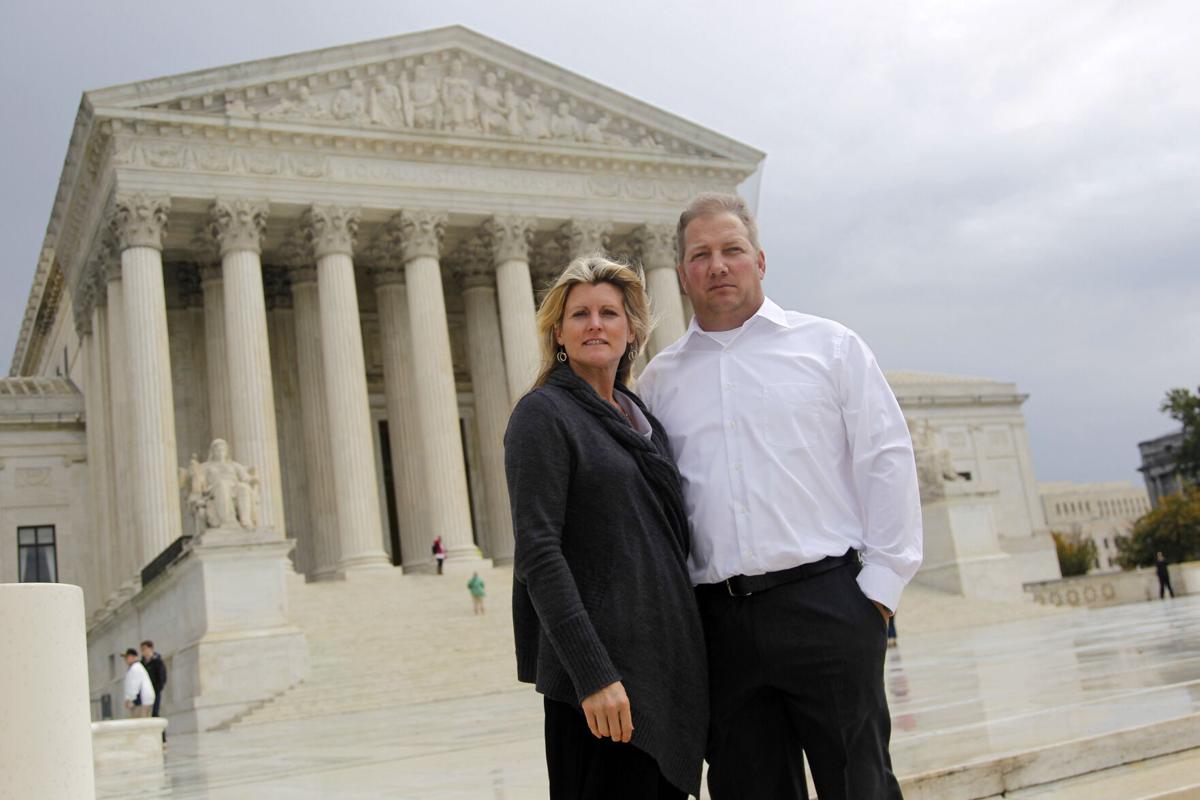Intro: What caused the ruling?
The Supreme Court has ruled in favor of a family whose push to build a new house on wetlands was challenged under the EPA's ...
Supreme Court limits EPA’s authority over wetlands, boosts property rights over clean water

FILE - Michael and Chantell Sackett of Priest Lake, Idaho, pose for a photo in front of the Supreme Court in Washington on Oct. 14, 2011.
WASHINGTON — The Supreme Court on Thursday made it harder for the federal government to police water pollution in a decision that strips protections from wetlands that are isolated from larger bodies of water.
It's the second decision in as many years in which a conservative majority of the court narrowed the reach of environmental regulations.
The justices boosted property rights over concerns about clean water in a ruling in favor of an Idaho couple who sought to build a house near Priest Lake in the state's panhandle. Chantell and Michael Sackett objected when federal officials identified a soggy portion of the property as a wetlands that required them to get a permit before building.
- By a 5-4 vote, the court said in an opinion by Justice Samuel Alito that wetlands can only be regulated if they have a "continuous surface connection" to larger, regulated bodies of water.
- The court jettisoned the 17-year-old opinion by their former colleague, Anthony Kennedy, allowing regulation of wetlands that have a "significant nexus" to the larger waterways.
Kennedy's opinion had been the standard for evaluating whether wetlands were covered under the Clean Water Act. Opponents had objected that the standard was vague and unworkable.
- Environmental advocates had predicted that narrowing the reach of that law would strip protections from more than half the wetlands in the country.
Reacting to the decision, Manish Bapna, the chief executive of the Natural Resources Defense Counsel, called on Congress to amend the Clean Water Act to restore wetlands protections and on states to strengthen their own laws. . .
The outcome almost certainly will affect ongoing court battles over new wetlands regulations that the Biden administration put in place in December. Two federal judges have temporarily blocked those rules from being enforced in 26 states.
In Thursday's ruling, all nine justices agreed that the wetlands on the Sacketts' property are not covered by the act.
- But only five justices joined in the opinion that imposed a new test for evaluating when wetlands are covered by the Clean Water Act.
- Conservative Brett Kavanaugh and the court's three liberal justices charged that their colleagues had rewritten that law.
Kavanaugh wrote that the court's "new and overly narrow test may leave long-regulated and long-accepted-to-be regulable wetlands suddenly beyond the scope of the agencies' regulatory authority."
- Justice Elena Kagan wrote that the majority's rewriting of the act was "an effort to cabin the anti-pollution actions Congress thought appropriate." Kagan referenced last year's decision limiting the regulation of greenhouse gas emissions under the Clean Air Act.
In both cases, she noted, the court had appointed "itself as the national decision-maker on environmental policy."
- Kagan was joined in what she wrote by her liberal colleagues Sonia Sotomayor and Ketanji Brown Jackson."
| ||||||||
 Supreme Court Scales Back Scope of Clean Water ActDANIEL C. VOCK | Conservatives on the court say the decision preserves state authority to regulate land and water use. But liberal justices worry the ruling will gut efforts to curb water pollution. | ||||||||
// Elizabeth Daigneau The Supreme Court ruled that governments cannot keep surplus funds from the homes they sell after residents fail to pay property taxes. But local officials nationwide are breathing a sigh of relief that the court didn't go further. | ||||||||









No comments:
Post a Comment